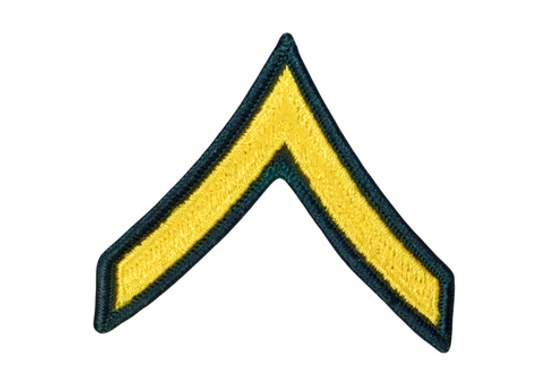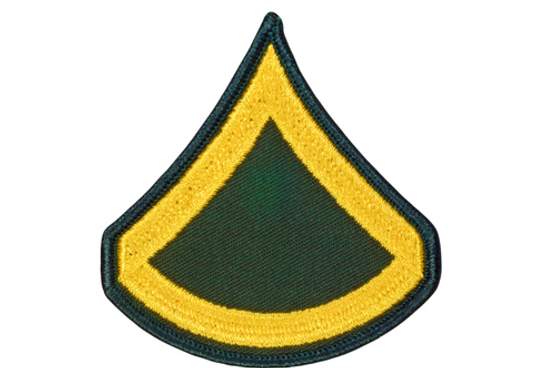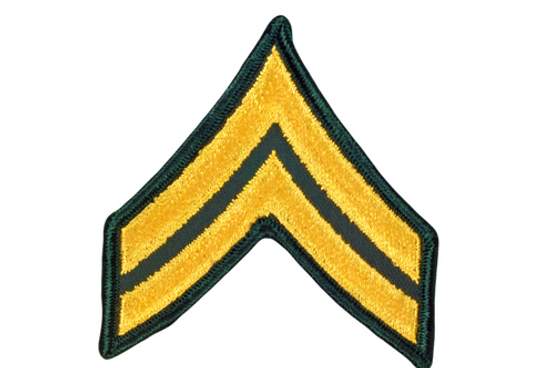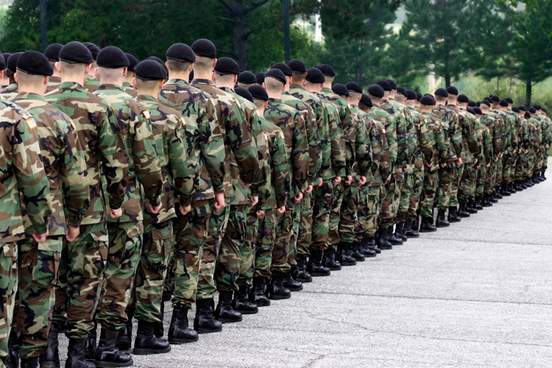
Private
Definition:
an enlisted person of the lowest rank in the marine corps or of one of the two lowest ranks in the army
In some languages, the lowest and most basic rank for soldiers is simply the word soldier. Private is in fact short for private soldier, and it has its origins in the U.S. Army—the first known use of the term comes from the correspondence of George Washington.
There are other words for “common soldier” or the lowest army rank, some of them particular to the British army, including fusilier, guardsman, rifleman, and trooper.
The rank insignia, shown as a cloth patch on the sleeve or a metal collar pin, is a single chevron.

Private First Class
Definition:
an enlisted man ranking in the army above a private and below a corporal and in the marine corps above a private and below a lance corporal
The rank of private first class was added to the U.S. Army in the mid-1800s as an intermediate designation between private and corporal that usually represented successful completion of specialized training or the attainment of diploma or degree of some kind. Its rank insignia is a single chevron pointing up with a single arc or line curving down that joins to each point of the bottom of the chevron.

Corporal
Definition:
a noncommissioned officer ranking in the army above a private first class and below a sergeant and in the marine corps above a lance corporal and below a sergeant
It might be tempting to connect the lowest grade of noncommissioned officer—presumably someone who disciplines soldiers—with corporal punishment, but that’s not where this word comes from.
The corporal in corporal punishment comes from the Latin word for “body,” corpus. But the military rank actually comes from the French word for “head of a small unit of soldiers,” caporal, ultimately from the Latin word for “head,” caput, which is also the root of the name for the rank of the head of a company of soldiers, captain.
It seems possible that the influence of corpus and the French-derived word corps meaning “a group of soldiers” caused the word caporal to evolve into corporal. It’s a strange mixing up of root words meaning “body” and “head” in order to arrive at corporal. The rank of lance corporal is used in the U.S. Marine Corps and represents a rank above a private first class and below a corporal.

Specialist
Definition:
an enlisted rank in the U.S. Army corresponding to the grade of corporal
also : any of several former enlisted ranks corresponding to the grades of sergeant through sergeant major
In order to acknowledge training and ability for certain military roles, the rank of specialist was created to give the same pay status of a noncommissioned officer without the command responsibilities. The rank of specialist was created in 1955 for the U.S. Army. Specialists may have roles such as medic, musician, engineer, or military police.
During World War II, a similar position was called technician and was indicated by the letter T printed under the stripes of a corporal or sergeant.

Sergeant
Definition:
a noncommissioned officer ranking in the army and marine corps above a corporal and below a staff sergeant Sergeant is the common name for many of the noncommissioned officer ranks. Often these are the people directly responsible for training and leadership of soldiers in the field.
The word sergeant has the same Latin root as servant. The original military use of sergeant was the term sergeant at arms—the position was an “armed servant” of a medieval lord. (Today a sergeant at arms is the title of a person who preserves order, makes ceremonial announcements, and provides security for courtrooms and legislative chambers.)
A drill sergeant is responsible for training soldiers. There are many varieties of sergeants, including a hierarchy of specific ranks denoting duties and seniority, given in detail below.
The insignia for the rank of sergeant in most U.S. armed forces and police is three upward chevrons. As the different kinds of sergeant rise in seniority, arcs or curved lines below the chevrons indicate increasing rank.
Staff sergeant
a noncommissioned officer ranking in the army above a sergeant and below a platoon sergeant or sergeant first class, in the air force above a sergeant and below a technical sergeant, and in the marine corps above a sergeant and below a gunnery sergeant
Sergeant first class
a noncommissioned officer in the army ranking above a staff sergeant and below a master sergeant
Master sergeant
a noncommissioned officer ranking in the army above a sergeant first class and below a staff sergeant major, in the air force above a technical sergeant and below a senior master sergeant, and in the marine corps above a gunnery sergeant and below a master gunnery sergeant
First sergeant
a rank in the army above a sergeant first class and below a sergeant major and in the marine corps above a gunnery sergeant and below a master gunnery sergeant
Sergeant major
1 : a noncommissioned officer in the marine corps ranking above a first sergeant
2 : a noncommissioned officer in the army, air force, or marine corps serving as chief administrative assistant in a headquarters
Command sergeant major
a noncommissioned officer in the army ranking above a first sergeant
Sergeant major of the Army
the ranking noncommissioned officer of the army serving as adviser to the chief of staff

Warrant Officer
Definition:
1 : an officer in the armed forces holding rank by virtue of a warrant and ranking above a noncommissioned officer and below a commissioned officer
2 : a commissioned officer ranking below an ensign in the navy or coast guard and below a second lieutenant in the marine corps
A warrant officer ranks above a noncommissioned officer and below a commissioned officer. Normally a warrant officer has a specialization or skill such as a pilot or a technical specialist rather than command of a unit of soldiers or sailors.
Warrant is used to distinguish warrant officers from commissioned officers, and even though warrant and commission can be synonyms, commission is the term used from the 1500s to refer to the authority granted to an officer.
Originally, warrant officers in the Royal Navy included the ship’s surgeon, purser, and navigator.
The Army, Navy, Marine Corps, and Coast Guard all have several grades of warrant officer, usually designated as chief warrant officer followed by numerals for seniority:
Chief warrant officer 2
Chief warrant officer 3
Chief warrant officer 4
Chief warrant officer 5

Lieutenant
Definition:
a commissioned officer in the navy or coast guard ranking above a lieutenant junior grade and below a lieutenant commander
Lieutenant is the lowest of the noncommissioned officer ranks, and the word’s origin helps explain why: the French words lieu tenant literally translates as “place holding.” So a lieutenant is a placeholder, one who takes the place or of or is deputy to a superior officer. In non-military contexts, lieutenant is a synonym of assistant or deputy.
In the U.S. military, a lieutenant in the navy is the equivalent of a captain in the army. In the army, a junior lieutenant is a second lieutenant, usually a newly commissioned young officer. A first lieutenant is the more senior rank in the army; it was formerly used in the navy to identify the second in command of a ship.
second lieutenant
a commissioned officer of the lowest rank in the army, air force, or marine corps
first lieutenant
a commissioned officer in the army, air force, or marine corps ranking above a second lieutenant and below a captain

Captain
Definition:
a commissioned officer in the army, air force, or marine corps ranking above a first lieutenant and below a major
Captain is the most ancient of military rank designations in English, in use as a general word for “military leader” since the 1400s. It came to English, like all the military ranks, from French, and the ultimate Latin root of this word is caput, meaning “head”—a captain is the “head” of a group or organization.
A captain in the army is typically the commanding officer of a company; in the navy, a captain is the commanding officer of a ship. In the U.S. military, a navy captain is the equivalent rank of an army colonel.

Major
Definition:
a commissioned officer in the army, air force, or marine corps ranking above a captain and below a lieutenant colonel
The military rank of major is in fact a shortened form of sergeant major, which in the 1500s and 1600s was an officer who ranked higher than a captain. The sergeant was dropped as modern distinctions between noncommissioned officers and commissioned officers became more settled.
In the U.S. military, a major in the army or marines is the equivalent rank of a lieutenant commander in the navy.

Lieutenant Colonel
Definition:
a commissioned officer in the army, air force, or marine corps ranking above a major and below a colonel
The words lieutenant colonel put together mean the “assistant” or “deputy” colonel, since lieutenant has those meanings. In practice, it is a senior commissioned officer who can command a brigade or regiment. Because of the abbreviation Lt. Colonel, this rank is occasionally and informally referred to as light colonel. A lieutenant colonel is often referred to or addressed as colonel.
In the U.S. military, a lieutenant colonel in the army is the equivalent rank of a commander in the navy.

Colonel
Definition:
a commissioned officer in the army, air force, or marine corps ranking above a lieutenant colonel and below a brigadier general
The name of the rank of colonel literally derives from being “leader of a column” of soldiers.
In the U.S. military, a colonel in the army is the equivalent rank of a captain in the navy. The reason that colonel is pronounced like kernel in English is that the French borrowed colonel from Italian and pronounced the word with an /r/ sound, spelling it coronel. The word then came into English from French. By the 1600s, the relationship to the Italian and Latin roots of column was made more clear by respelling the word with an L, but the pronunciation was already established by that time.

Brigadier General
Definition:
a commissioned officer in the army, air force, or marine corps who ranks above a colonel and whose insignia is one star
If, etymologically, a colonel commands a column, then a brigadier commands a brigade.
The rank of brigadier general is the lowest ranking general officer in the armed forces. The same rank in the British army is simply a brigadier.

Major General
Definition:
a commissioned officer in the army, air force, or marine corps who ranks above a brigadier general and whose insignia is two stars
The rank of major general was originally called sergeant major general until the early 1700s. The sergeant was dropped as modern distinctions between noncommissioned officers and commissioned officers became more settled. Sergeant major became used as the highest ranking noncommissioned officer beginning around 1800.

Lieutenant General
Definition:
a commissioned officer in the army, air force, or marine corps who ranks above a major general and whose insignia is three stars
The rank of lieutenant general originally referred to the officer who is second in command, the deputy or “lieutenant” to the general.
There is an interesting slippage between adjective and noun in some of these names for ranks.
They derive from French rank titles, and in French, adjectives often follow nouns rather than precede them; this is where terms like attorney general, poet laureate, and queen consort come from. But some adjectives look just like their related nouns: an attorney general is not a “general who is an attorney” but the “attorney with a broad (general) jurisdiction.” Similarly, a sergeant major is the “major” or “most important” sergeant. Originally, the lieutenant general was the “overall” or “general” lieutenant, or the second in command of all troops in a large body of soldiers.

General
Definition:
a commissioned officer in the army, air force, or marine corps who ranks above a lieutenant general and whose insignia is four stars
The rank of general comes from general officer, or the “officer with the broadest (most general) command.” Officers with the ranks of brigadier general, major general, and lieutenant general are often referred to simply as “general.”

General of the Army
Definition:
a general of the highest rank in the army whose insignia is five stars
The five-star general, general of the army, is a rank that has not been used in the U.S. military since World War II. It is the equivalent of the British army rank of field marshal.




